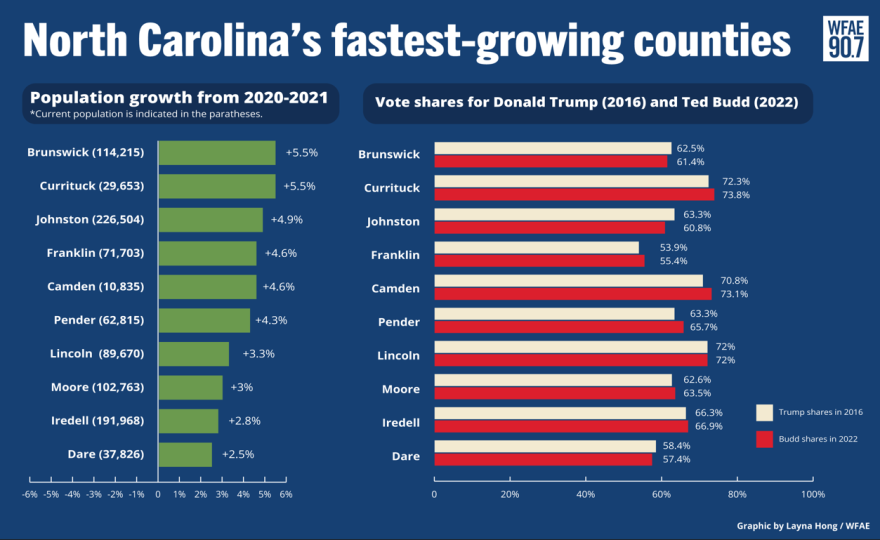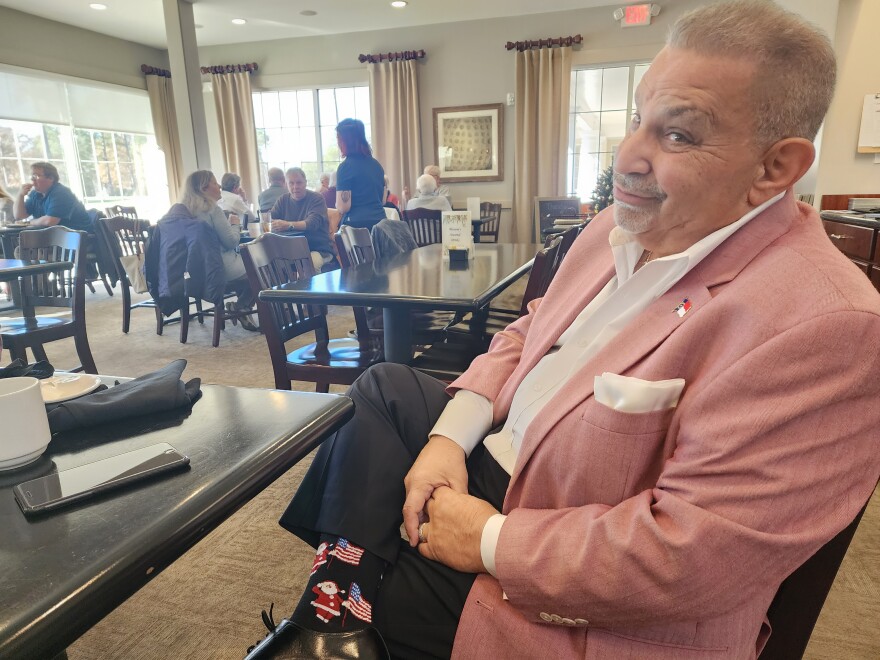In a three-part series, WFAE looks at why Democrats continue to lose in most statewide races. Part 1 focuses on how the demographic changes in some of the fastest-growing counties in North Carolina fuel those results.
Larry Blank, the vice chair of the Brunswick County Republican Party, is bragging about his adopted hometown of Leland.
In two decades, it’s gone from a collection of strip malls across the Cape Fear River from Wilmington to one of North Carolina’s fastest-growing municipalities.
“(To) go from 2,500 or 3,000 residents to 25,000 — that’s a heckuva growth,” said Blank, a retiree from New Jersey.
More people. More restaurants. More things to do.
But I told Blank that when you type “downtown Leland” into Google Maps, the app sends you to a palm-tree-lined shopping center with a Harris Teeter and a Panera off U.S. 17.
“Right here, to this shopping center? That’s amazing,” Blank said laughing. “There is no downtown Leland, as you found out.”
That’s because Leland was founded in 1989.
Not 1899, but in 1989.
SUPPORT LOCAL NEWS

As a nonprofit newsroom, WFAE relies on readers like you to make stories like this possible. Our local reporting is vital to the health of our communities and our democracy, but we can’t do this without you. Please consider supporting our journalism by contributing as little as $10 today.
It’s now a collection of planned communities catering to Baby Boomer retirees: Magnolia Greens. Compass Pointe.
And Blank’s community, Brunswick Forest, whose promotional videos tout golf, miles of walking trails and clubs that include shag and line dancing.
Blank loves his Brunswick lifestyle, though he said he’s threatened by what’s happening politically across the nation. He often wears a red “Save America” baseball cap.
“I feel very strongly, I feel America is under attack,” he said. “I feel my values are under attack that I have developed along a lifetime.”

Blank and his neighbors have helped make Brunswick the oldest county in North Carolina, with 1 of every 3 residents 65 or older.
And they have turned it into a Republican stronghold — one reason the North Carolina GOP has won the last three presidential races and the last five U.S. Senate races.
A Democratic presidential candidate has won North Carolina only once since 1976, when Barack Obama defeated Republican John McCain by less than half a percentage point in 2008. Democrats have lost U.S. Senate races in 2010, 2014, 2016, 2020 and 2022.
To understand why North Carolina Democrats keep falling short, WFAE reporters traveled U.S. 74, from the beach to Charlotte, examining the forces that are keeping the GOP one step ahead of Democrats in statewide federal races.
The first stop: Brunswick County, which shows demographic changes don’t always favor the Democratic Party.
Conventional wisdom is that newcomers moving to Charlotte and the Triangle are turning North Carolina blue.
That thinking notes that while the state’s largest cities are swelling with young, diverse and progressive voters, the Republican Party is left with the state’s rural areas, where the population is often falling. That’s where older voters — who once voted Democratic — are now keeping the GOP alive.
There is a lot of truth in that.
But it misses another key part of North Carolina politics: The state’s fastest-growing counties are increasingly Republican.
GOP strength in fast-growing areas
Republican Ted Budd won all of the state’s 10 fastest-growing counties in November’s U.S. Senate race. He received the same percentages there as Donald Trump did in 2016.
Those counties include Brunswick County, southwest of Wilmington, and Pender County, to the north. Other fast-growing counties like Camden, Currituck and Dare are also near the Atlantic Ocean.

Exurban counties near urban areas, like Iredell north of Charlotte and Johnston outside of Raleigh, are also in the top 10
Jonathan Felts was an advisor to Budd during his campaign against Democrat Cheri Beasley this fall.
He remembers talking to reporters on election night.
“They would ask me where we were doing well,” he said. “I would always say ‘Any place there are retirees.’”
Brunswick Democratic Party chair Eric Terashima, a former Marine, said the influx of retirees to Brunswick County has darkened Democrats’ prospects locally — and statewide. Budd won every precinct in Brunswick.
“We are in fact one of the oldest counties in the United States, and we’re one of the fastest-growing counties in the United States as well,” Terashima said. “The folks who I am seeing moving in here for the last couple of years have been 2-to-1 right-leaning, if not Republicans.”
In the 2000 election, Brunswick County was a mostly insignificant part of George W. Bush’s victory in North Carolina. He defeated Al Gore in Brunswick by 2,300 votes.
In 2020, Donald Trump won Brunswick by 22,500 votes, cleaning up with 61.9% .
In 2022, despite a much lower turnout because it was a non-presidential election, Budd won Brunswick by 18,226 votes, or 61.4%.
Budd won 79 of North Carolina’s 100 counties. Only seven of those counties gave Budd more net votes than Brunswick.
J. Miles Coleman, who works at the University of Virginia’s Center for Politics, said North Carolina’s vast coastline makes it attractive for retirees.
He said that’s an important difference between North Carolina and Georgia, where Democrats won the 2020 presidential race and the last three U.S. Senate elections.
“It almost seems dumb and simplistic to put this out there, but Georgia doesn’t have much of a coastline,” Coleman said. “There’s not a lot of room for retirees to look at beachfront property there.”
He said that’s one reason Democrats have made inroads in Georgia (14.7% of its population is 65 and older), while North Carolina (17% of its population is 65 and older) has been out of reach. Georgia also has a larger African American population than North Carolina — a dynamic amplified in some of the fastest-growing counties.
Brunswick County is 83% white, non-Hispanic.
Coleman said North Carolina is seeing some demographic shifts similar to Florida, though on a smaller scale. In Florida, massive new retirement communities like The Villages near Orlando are pushing that state to the right.
“One of the things that’s made Florida less competitive over time is that you have a lot of conservative retirees moving from the north,” said Kyle Kondik, managing editor of Sabato’s Crystal Ball, the University of Virginia Center for Politics’ newsletter. “And Brunswick is a place where you see that dynamic in North Carolina.”
Focus on affordability
Another planned community that caters to retirees is Magnolia Greens, which is a short drive from the city’s non-existent downtown.
Budd won the precinct that covers that community by nearly 10 percentage points. He won by larger margins in areas of Brunswick closer to the beach and to the South Carolina state line.
Brunswick Republican County Commissioner Mike Forte, a transplant from New Jersey, lists the hometowns of his lunch companions: Fairfax County, Virginia; Connecticut; Vermont; New York and New Jersey.

And those guests describe their politics as either Republican or conservative.
The group is talking about why they moved to Brunswick County. A big topic: taxes.
Forte — who is wearing a salmon-colored jacket, and has socks with Santas holding American flags — said the property taxes on his house in New Jersey were more than $15,000. When he bought his first house in Brunswick nearly 20 years ago, he was stunned to learn his new tax bill would be in the hundreds of dollars.
“(My agent) said, ‘That’s your taxes.’ I said, ‘What is that weekly?’” Forte remembers his closing. “And he looked at me befuddled and said no, that’s for the year. I said, get the heck out of here, that’s a night out with my wife. That’s dinner and a bottle of wine.”
The other guests have similar stories: Property and income taxes were too high in the Northeast, and they are thrilled to have left.
If you are from Charlotte and only pass through Brunswick heading to the beach, you may never see this inland empire of retirees.
But for those who retire here, golf and great weather — not the ocean — are often the huge draws, says Rich Leary, who moved from Connecticut.
“Magnolia has its own golf course, Brunswick Forest has its own golf course,” he said. “And within a 45-minute drive from here I think there are somewhere in the neighborhood of 85 to 90 golf courses you can play at.”
Then we talk politics. Was there a way Democrat Cheri Beasley could have beaten Budd?
Greta Lehman grew up in Fayetteville, moved to Washington, D.C. and then retired in Brunswick. She said Beasley needed “to stop the woke nonsense that they were still preaching up till Election Day. That didn’t sit well with any of my neighbors, of any political agenda.”
The reality is that Beasley ran a centrist campaign, steering clear of social issues like transgender rights and critical race theory.
Beasley also said over the summer she opposed defunding the police. But Lehman said no one she knew believed Beasley was a moderate.
“It was ingenuine, and they didn’t buy it,” she said.
Brunswick Commissioner Frank Williams, a Republican, said the last national Democrat to compete in Brunswick was Congressman Mike McIntyre, who retired in 2015 after serving for eight years.
He said McIntyre got support in Brunswick because he was “a pro-life, socially conservative moderate Democrat who could probably not win a Democratic primary today.”
Leary said he realizes North Carolina’s cities have become more Blue. So he works to counter that.
“One of the things we focus on here in the county is making sure we absolutely maximize our vote, because we know on a statewide race we have to offset Charlotte-Mecklenburg and all those,” he said.
That has worked. While turnout in November’s election was 51% statewide, it was 58% in Brunswick County.
Here is another way to look at it: Mecklenburg County has nearly eight times the population as Brunswick.
But in this year’s Senate race, it only cast five times as many ballots.







